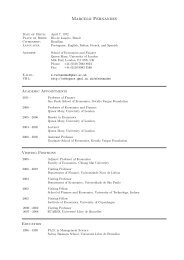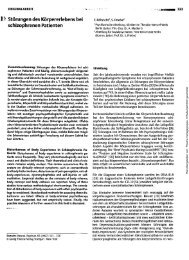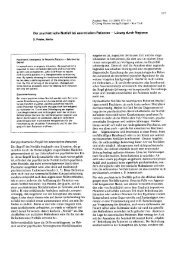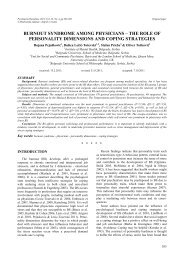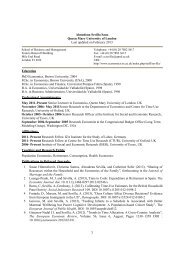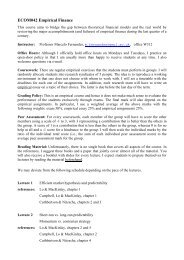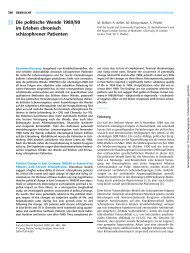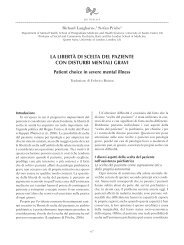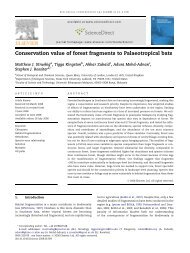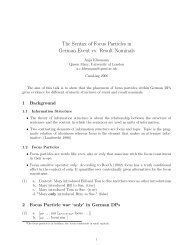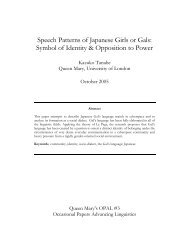Proofs - Personal Webspace for QMUL - Queen Mary, University of ...
Proofs - Personal Webspace for QMUL - Queen Mary, University of ...
Proofs - Personal Webspace for QMUL - Queen Mary, University of ...
Create successful ePaper yourself
Turn your PDF publications into a flip-book with our unique Google optimized e-Paper software.
Epilogue<br />
A. Kleinman<br />
Esther and Sydney Rabb Pr<strong>of</strong>essor <strong>of</strong> Anthropology, Pr<strong>of</strong>essor <strong>of</strong> Psychiatry<br />
Victor and William Fung Director, Asia Center, Harvard <strong>University</strong><br />
It is so important to see European, and especially German,<br />
anthropologists and psychiatrists deal with the health and<br />
health care problems experienced by immigrants and ethnic<br />
minorities. This is evidence <strong>of</strong> several important 21st century<br />
developments: the increasing diversity <strong>of</strong> European societies,<br />
the growing interest in culture in European medicine,<br />
the connection <strong>of</strong> cross- cultural studies in the mental health<br />
fi eld to global health, and interdisciplinary ef<strong>for</strong>ts <strong>of</strong> social<br />
scientists and physicians to go beyond conventional biomedical<br />
categories and practices in order to construct a new object<br />
<strong>of</strong> enquiry: that is, a more patient and family oriented way<br />
<strong>of</strong> examining caregiving and carereceiving. This collection<br />
illustrates the value <strong>of</strong> taking culture seriously in medicine<br />
because <strong>of</strong> the cultural processes that affect patients, families<br />
and communities. But the collection points toward yet another<br />
reason why culture matters; and that is that medicine itself is<br />
affected by cultural processes and in turn is one <strong>of</strong> the leading<br />
edges <strong>of</strong> the wedge <strong>of</strong> culture that remakes everyday life<br />
everywhere today. Furthermore, in the face <strong>of</strong> anti- immigrant<br />
political movements in Europe and North America, medicine<br />
and anthropology can exercise a countervailing infl uence that<br />
carries its own long- term cultural signifi cance.<br />
Perhaps the most infamous recent example <strong>of</strong> how the<br />
culture <strong>of</strong> medicine operates to affect health and health care is<br />
medicalization or what is also called overdiagnosis. Worldwide,<br />
ICD and DSM categories legitimize practices that end up redefi<br />
ning normality as pathology, that convert risk factors into<br />
disease and that also make such early diagnosis <strong>of</strong> disease that<br />
physiology and symptoms diverge ever more with people feeling<br />
well who can be shown to have the earliest possible biological<br />
evidence <strong>of</strong> treatable conditions, at which point it is entirely<br />
uncertain whether to treat or not.<br />
© 2012 Elsevier Masson SAS. All rights reserved.<br />
European Psychiatry 27 (2012) / supplement n°2 / S81-S82<br />
<strong>Pro<strong>of</strong>s</strong><br />
68767<br />
EUROPEAN<br />
PSYCHIATRY<br />
THE JOURNAL OF THE EUROPEAN PSYCHIATRIC ASSOCIATION<br />
ISSN 0924-9338<br />
June 2012<br />
Vol. 27 - Supplement n°2<br />
pp. S1-S81<br />
Migration<br />
and Mental Health<br />
S1 Editorial<br />
A. Heinz, U. Kluge<br />
S4 The willingness to participate in health research<br />
studies <strong>of</strong> individuals with Turkish migration<br />
backgrounds: barriers and resources.<br />
A qualitative analysis <strong>of</strong> focus groups<br />
D. Dingoyan, H. Schulz, M. Mösko<br />
S10 Socio-economic status and emotional distress<br />
<strong>of</strong> female Turkish immigrants and native<br />
German women living in Berlin<br />
MC. Aichberger, Z. Bromand, A. Heredia<br />
Montesinos, S. Temur-Erman, A. Mundt, A.<br />
Heinz, MA. Rapp, M. Schouler-Ocak<br />
S17 Mental health <strong>of</strong> Turkish woman in Germany:<br />
resilience and risk factors<br />
Z. Bromand, S. Temur-Erman, R. Yesil,<br />
A. Heredia Montesinos, MC. Aichberger,<br />
D. Kleiber, M. Schouler-Ocak, A. Heinz,<br />
MC. Kastrup, MA. Rapp<br />
S22 The infl uence <strong>of</strong> stigma on depression, overall<br />
psychological distress, and somatization<br />
among female Turkish migrants<br />
A. Heredia Montesinos, MA. Rapp, S. Temur-<br />
Erman, A. Heinz, U. Hegerl, M. Schouler-Ocak<br />
S27 Translation and adaptation <strong>of</strong> the Zung<br />
Self-Rating Depression Scale <strong>for</strong> application<br />
in the bilingual Azerbaijani population<br />
F. Mammadova, M. Sultanov, A. Hajiyeva,<br />
M. Aichberger, A. Heinz<br />
S32 Construction and interpretation <strong>of</strong> self-related<br />
function and dysfunction in Intercultural<br />
Psychiatry<br />
A. Heinz, F. Bermpohl, M. Frank<br />
S44 Explanatory models and concepts <strong>of</strong> West<br />
African Malian patients with psychotic<br />
Symptoms<br />
F. Napo, A. Heinz, A. Auckenthaler<br />
S50 How to express mental health problems:<br />
turkish immigrants in Berlin compared to native<br />
Germans in Berlin and Turks in Istanbul<br />
A. Vardar, U. Kluge, S. Penka<br />
S56 Health services and the treatment <strong>of</strong><br />
immigrants: data on service use, interpreting<br />
services and immigrant staff members<br />
in services across Europe<br />
U. Kluge, M. Bogic, W. Devillé, T. Greacen,<br />
M. Dauvrin, S. Dias, A. Gaddini, NK. Jensen,<br />
E. Ioannidi-Kapolou, R. Mertaniemi,<br />
R. Puipcinós i Riera, S. Sandhu, A. Sarvary,<br />
JFF. Soares, M. Stankunas, C. Straßmayr,<br />
M. Welbel, A. Heinz, S. Priebe<br />
S63 The German concept <strong>of</strong> “intercultural opening”<br />
as an answer to challenges <strong>of</strong> migration<br />
- the development <strong>of</strong> an assessment tool<br />
<strong>for</strong> the appraisal <strong>of</strong> its current implementation<br />
in the mental health care system<br />
S. Penka, U. Kluge, A. Vardar, T. Borde,<br />
D. Ingleby<br />
S 70 Cross-cultural training in mental health care<br />
– challenges and experiences from Sweden<br />
and Germany<br />
S. Bäärnhielm, M. Mösko<br />
S75 Teaching psychiatry and establishing<br />
psychosocial services – lessons<br />
from Afghanistan<br />
I. Missmahl, U. Kluge, Z. Bromand, A. Heinz<br />
S80 Afterword<br />
A. Kleinman<br />
DSM- 5 has stirred controversy even prior to its <strong>for</strong>mal<br />
release by the American Psychiatric Association by removing<br />
bereavement as a reason to exclude the diagnosis <strong>of</strong> depression.<br />
Since depression and grief have the same symptoms, this<br />
means in effect that after 2 weeks <strong>of</strong> grieving, individuals will<br />
be diagnosed as clinically depressed and treated with drugs<br />
and psychotherapy. There is no evidence such treatment works<br />
with normal individuals who are overdiagnosed or pressured<br />
by medicalization to trade normality <strong>for</strong> pathology. Hence what<br />
becomes a pr<strong>of</strong>i t center <strong>for</strong> the psychopharmacology- psychiatry<br />
industrial complex is simultaneously an enormous cultural<br />
change with potentially pr<strong>of</strong>ound consequences <strong>for</strong> individuals,<br />
families, communities and medicine itself. At the same time, we<br />
have come to understand that medicine can be, un<strong>for</strong>tunately,<br />
a powerful source <strong>of</strong> stigma <strong>for</strong> conditions like mental illness,<br />
AIDS, and TB. This is yet another example <strong>of</strong> culture at work in<br />
medical practices and relationships.<br />
Globalization not only increases migration, and thereby<br />
diversifi es and pluralizes societies; it also is responsible <strong>for</strong><br />
deep and extensive culture change. The new generations <strong>of</strong><br />
young adults and children have been so thoroughly infl uenced<br />
by the internet, social media, and other new technologies that<br />
their subjectivity and interpersonal relations are distinctive. For<br />
example, my colleagues and I in our recent book, Deep China:<br />
the Moral Life <strong>of</strong> the Person, show that Chinese today, especially<br />
young adults and children, are much more individualistic, materialistic,<br />
and globalized than earlier generations. Their priority <strong>for</strong><br />
relationships, unlike their parents and earlier generations, is <strong>for</strong><br />
horizontal rather than vertical ties. Romantic love has replaced<br />
fi lial relations as the core emotional and moral attachment. This<br />
generation is more interested in personal happiness, selfi sh<br />
interests, and sexual fulfi llment, and spiritual quests than their<br />
14_Kleinman.indd S81 14/06/2012 14:46:56



